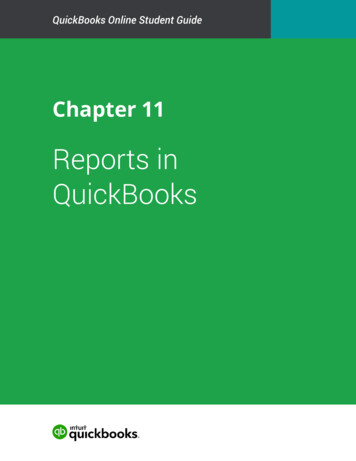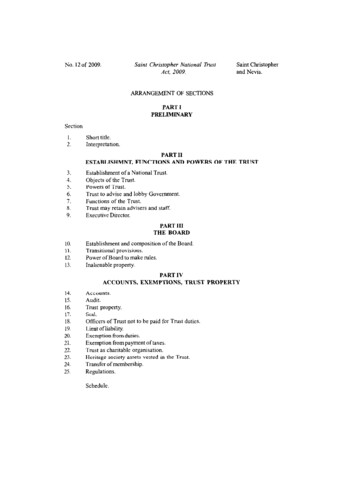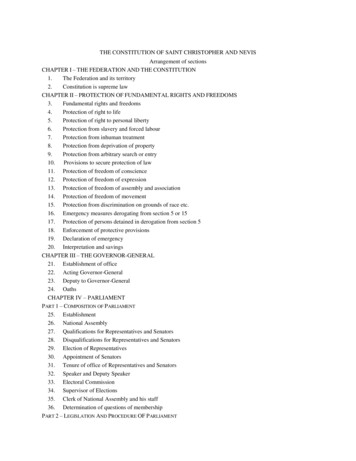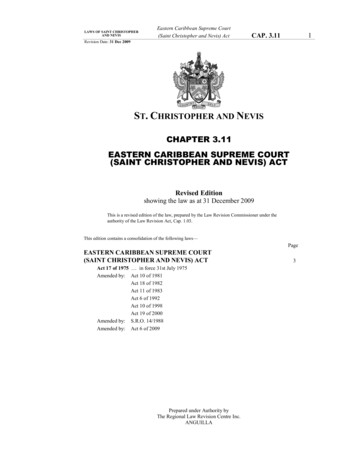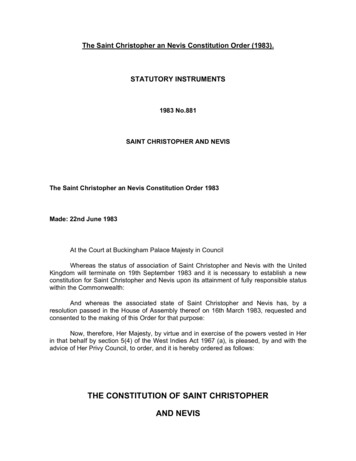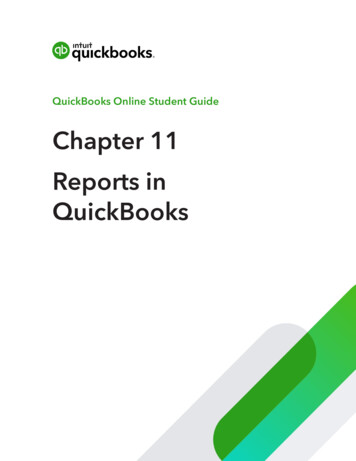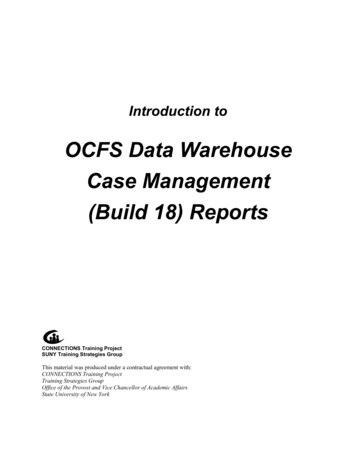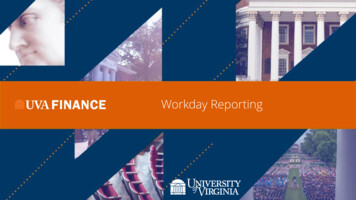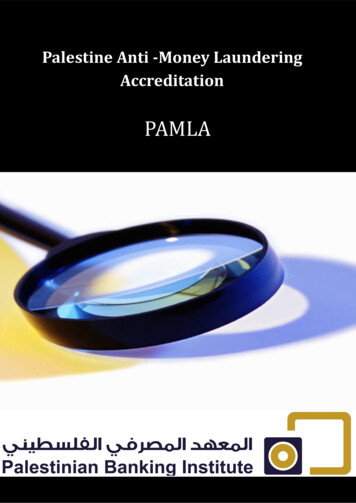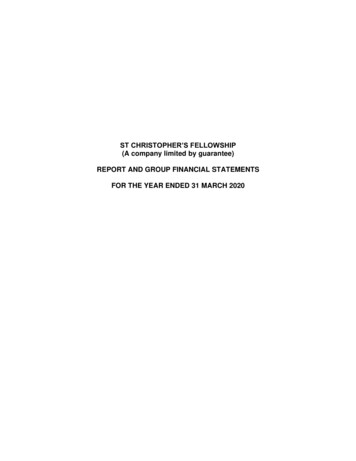
Transcription
ST CHRISTOPHER’S FELLOWSHIP(A company limited by guarantee)REPORT AND GROUP FINANCIAL STATEMENTSFOR THE YEAR ENDED 31 MARCH 2020
ST CHRISTOPHER’S FELLOWSHIPREFERENCE AND ADMINISTRATIVE DETAILSFOR THE YEAR ENDED 31 MARCH 2020CONTENTSPageReference and Administrative Details2-3Report of the Chair4-5Strategic and Board Report6 – 29Report of the Independent Auditors30– 32Consolidated Statement of Comprehensive Income33Consolidated and Parent Statement of Financial Position34Consolidated and Parent Statement of Changes in Reserves35Consolidated Statement of Cash Flows36837 – 61Notes to the Financial Statements1
ST CHRISTOPHER’S FELLOWSHIPREFERENCE AND ADMINISTRATIVE DETAILSFOR THE YEAR ENDED 31 MARCH 2020LEGAL DETAILSRegistered Name: St Christopher’s FellowshipOther names used: St Christopher’sA company limited by guarantee, registered no. 321509Registered Charity no. 207782Registered Provider of Social Housing no. LH1832VAT Registration Number 740 5442 53REGISTERED OFFICE1 Putney High StreetLondonSW15 1SZTRUSTEES/ MEMBERS/ DIRECTORSThe Trustees who are also Directors and members who served from 1 April 2019 up tothe date of approval of these financial statements were as follows:Joe AnichebeDavid BrownAngela DakinRupert DuffKelly DooleyGill Guy-EdwardsJohn HalliwellDaniel HobbsBert O’DonoghueSally O’NeillAkua Doreen Owusu-AkonorDinesh VisavadiaThomas Wilson(Vice Chair)(appointed 3 September 2020)(appointed 8 May 2019)(retired 20 November 2019)(appointed 8 May 2019)(Chair)(appointed 8 May 2019)(Honorary Treasurer)(retired 9 September 2020)COMPANY SECRETARYSara KortenrayBert O’Donoghue(appointed 16 October 2019)(retired 16 October 2019)2
ST CHRISTOPHER’S FELLOWSHIPREFERENCE AND ADMINISTRATIVE DETAILSFOR THE YEAR ENDED 31 MARCH 2020PRINCIPAL STAFFDoris Afreh FCIPD PG Dip HRMGeneva Ellis BA (Hons) M.ScFaye Puttock ACMA CGMAAnne SeedPhilip Townsend BA (Hons) PG Dip HS FCIHJonathan Whalley(Director of People)(Director of Income & Development)(Director of Finance)(Director of Operations–Isle of Man)(Director of Operations-UK)(Chief Executive)SOLICITORSTrowers & Hamlins3 Bunhill RowLondonEC1Y 8YZRussell-Cooke2 Putney HillPutneyLondonSW15 6ABBANKERSNational Westminster Bank16 Wimbledon Hill RoadLondonSW19 7ZDEXTERNAL AUDITORSBeever and StruthersSt. George’s House215-219 Chester RoadManchesterM15 4JE3
ST CHRISTOPHER’S FELLOWSHIPREPORT OF THE CHAIRFOR THE YEAR ENDED 31 MARCH 2020I am delighted to present the Annual Report and Accounts for the year highlighting some ofour fantastic work with the children and young people that we care for. This year marks our150th year of helping children and young people have a solid start in life and creating brightfutures. We have grown and developed over this time, adjusting our services to meet theneeds of the day and building our expertise.We had plans to celebrate this anniversary with our staff, foster carers, children and youngpeople throughout the year. However, given the challenges experienced in all corners of theworld by the COVID-19 pandemic. we have postponed these celebrations until our 151st year.Whilst this has not been the 150th year we anticipated, our staff and foster carers have beenabsolutely phenomenal at continuing to support young people. Children and young peoplehave been at the heart of our work and all our homes and services have remained openthroughout this period.Some of the operational successes over the past year include: a three-year extension to our Isle of Man contractsthe opening of two children’s homes in the West Midlands, in line with our strategyexpansion of our Staying Close project to support young people living in residentialhomesthe launch of our new mentoring service in Barnet providing preventative work withsiblings of young people known to the Youth Justice Systemexpanding our therapeutic service to cover all of our UK servicespiloting an alternative education offer in the UK to provide learning support to a widecohort of looked after childrenour first foster carer conference, which included the official poet for the LondonOlympics, Lemn Sissay as a guest speaker. One of our foster children shared herexperiences of moving to a Staying Put placement during her time at universityensuring she can return home to her foster family during holidays and weekends, atour Eastern Region ConferenceWe have continued rolling out our operational delivery model to ensure that we have the rightpeople, in the right place, at the right time to achieve our Vision & Strategy and have expandedthe reach of our UK therapeutic service. However, there were delays to the two planned newhomes in the West Midlands, which were further impacted by the pandemic. Expenditure forthe development plan was largely in line with budget but impacted by a reduction in expectedincome as a result of the delay in opening the first of these homes.The financial performance of some of our core operations was slightly weaker than we hadplanned and was not strong enough in the year to support the additional expenditure of thedevelopment programme. As a charity, we work with very narrow financial margins, so evensmall reductions in our revenue can impact our surpluses. However, I am pleased to reportthat we used some of our surplus cash to clear up some historical pension liabilities, resultingin a cleaner balance sheet.The Black Lives Matter movement has mobilised people across the world to protest againstracial injustice and oppression. As a Board of Trustees we are working with the SeniorLeadership Team to reflect, learn and develop to be a charity that is supportive for all.This has involved setting up a group with colleagues from across the organisation to considerthe issues and make recommendations about any changes needed to ensure St Christopher’s4
ST CHRISTOPHER’S FELLOWSHIPREPORT OF THE CHAIRFOR THE YEAR ENDED 31 MARCH 2020is an equal and just workplace, and is equipped to care for and support young people of allbackgrounds.To those that have supported us during the year – foster carers, commissioners, localauthorities, government departments, Ofsted and volunteers, thank you. Your contributionsmake a big difference to the work that we do. During the past year we have invested in ourfundraising team to help us raise funds to invest in additional services for the children andyoung people that we support. Thanks to all of our donors for your support, which has helpedus to provide added value services that are well beyond what we are contracted to by the localauthorities and governments that we support. This means we can do more for young people,just as good parents would do.I want to say a great big thank you to my fellow trustees who volunteer their time selflessly.Their on-going support and guidance both to me and to the organisation is wonderful and verymuch appreciated. Unfortunately, in September of this year we will say farewell to ThomWilson who has been a wonderful member of our board for the past three years. Thom broughtgreat insights and experience from his day job of working with young people at a localauthority. We are also fortunate to have some great new people joining us – Rupert Duff hasbeen a co-opted member of our Audit and Risk Committee for the past two years and nowjoins us as a trustee. We welcomed Kelly Dooley, Doreen Akanor and John Haliwell in May of2019 who between them have brought experience of education and human resources to ourCouncil. Welcome also to Lisa Nelson who joined the board of our Isle of Man subsidiary.And of course, thank you to the staff of the organisation, without whom we could do nothing.They often work in very challenging and stressful conditions, but I am always impressed bythe manner and dedication with which they work. The care, support and love that they give tothe children and young people that we look after is wonderful and I thank them most sincerelyfor that. In particular, this year, our front-line staff and foster carers have had the challengesand concerns of taking care of our children and young people, often in addition to their ownfamilies, during a global pandemic. This has been a particularly stressful time for them butthey have more than risen to the challenge and for that we are eternally grateful.Bert O’DonoghueChair of Trustees9 September 20205
ST CHRISTOPHER’S FELLOWSHIPSTRATEGIC AND BOARD REPORTFOR THE YEAR ENDED 31 MARCH 20201.MANAGEMENTAIMS AND ACTIVITIESAt St Christopher's we work in the British Isles as a charity and Registered Provider of SocialHousing. We currently work in Southern, Eastern and Central England and the Isle of Man,providing services to young people in care, care leavers and those on the edge of care. Ourservices include foster homes, children’s homes (including a secure children’s home), homesfor care leavers and homeless teenagers, outreach support, return home interviews for youngpeople who run away from home, preventative outreach, education support and therapeuticprovision. We also provide consultancy to local authorities and charities.OBJECTS SET OUT IN GOVERNING DOCUMENTOur objects as set out in the Articles of Association are to assist people in need, particularlychildren and young people and people with learning disabilities, to relieve poverty and toundertake any other charitable purpose.Our priorities during the year continued to be: continual improvement in service quality to create even better outcomes for children andyoung people speeding up recruitment processes and improve retention by better staff support andprogression improving spot purchase capabilities to meet or exceed financial and occupancy targets maximising asset usage to further enable and enhance service delivery expanding capability to respond creatively to the needs of children and young people, andcommissioners, to drive growth and create more brighter futuresSTRATEGIES FOR ACHIEVING OBJECTIVESIn November 2017, we started the process of setting our Vision and Strategy for 2018 to 2023.We felt it was important that the strategy properly reflected St Christopher's by beingparticipative, aligned with our ways of working, and centred on young people. Children, youngpeople and staff from across the organisation had their say on our strategy so that it is builtupon ideas that will benefit those we work with, now and in the future.Our three strategic aims are:1. Create more excellent homes, fostering and support for children & young peopleChildren and young people have told us that it's the relationships with carers in our fosteringand residential services that make their houses feel like homes. Over the five years of thestrategic plan are developing more excellent homes to even more children in care and careleavers. We are doing this by focusing on growing our residential, fostering and support toprovide services to double the number of children and young people by 2023.2. Improve emotional wellbeingWe will develop clinical therapeutic input across all of our services, so young people, carersand staff receive the expert advice and support they need, when they need it. Building on ourexisting strengths in attachment theory and social pedagogy, we will partner with mental healthorganisations to develop holistic, empowering, relationship-centred ways to improve emotionalwellbeing. After successful development of the Isle of Man therapeutic services over the last6
ST CHRISTOPHER’S FELLOWSHIPSTRATEGIC AND BOARD REPORTFOR THE YEAR ENDED 31 MARCH 2020five years we are using this learning to inform the ongoing development of our UK basedtherapeutic service.3. Promote lifelong learning and thrivingOur staff succeed with young people who have experienced very difficult starts in life throughrelationship-centred, creative approaches to learning that equip them for life in the world. Weare increasing capacity in the education and life skills teams to support more young people toachieve.We will collaborate with young people to help make each step of their journey to independenceeasier, maintaining important relationships with people that matter most, whether friends,family, carers, or St Christopher's staff. We will continue to invest in training and supportingour staff to enhance learning and develop skills to promote growth and career progression.We believe that practical experience in the direct provision of services for children and youngpeople can usefully inform policy development for looked after children, care leavers andvulnerable young adults. Because of this we participate in appropriate consultations and otherinitiatives that inform the development of government policy. For example, we partnered withThe Children's Society, Become, Centrepoint and other young people's charities to lobby thegovernment to ensure that care leavers benefit from higher rates of housing benefit until theage of 25. Prior to this change a care leaver could be forced to move from their stable hometo shared accommodation at the age of 22 following a cut to their housing support. However,Rishi Sunak, the Chancellor, has said that care leavers would be included in an extension ofthe exemption from the shared accommodation rate (SAR) for Universal Credit and housingbenefit claims. The move also includes rough sleepers aged 16 to 24 and victims of domesticabuse and human trafficking.We have also submitted evidence to the All Party Parliamentary Group for Runaway andMissing Children and Adults and were invited to meet with the minister directly. Our Safe Stepsproject, which has developed and assessed new approaches to looking after girls at risk ofchild sexual exploitation was used as a case study in the final report.The Department for Education launched a consultation on unregulated provisions (e.g. semiindependent and independent services) at the start of 2020. St Christopher's submitted anorganisational response to the consultation, which included the perspectives of staff workingin these homes and young people with experiences of unregulated services.Thanks to our strong reputation of providing quality unregulated services and our membershipof the Alliance for Children in Care and Care Leavers, we were able to connect with theDepartment for Education and offer even more information from young people about whatchanges they would like to see in the homes they live in. Support workers worked with youngpeople living in or formerly residing in their homes to discuss the consultation. There was anoverwhelming sense that the supportive relationships young people have with teams in ourhomes really can make a difference in their lives. The feedback has been shared with theDepartment of Education and will be considered as part of the consultationAs a charity, we aim to remain financially robust and ensure that the organisation and itsactivities are sustainable. This will enable the tradition, started in 1870, of providing servicesfor children in care, on the edge of care and leaving care to continue. We also recognise thatnew initiatives and services can require an initial investment, prior to the services becomingfinancially sustainable in the longer term. Consequently, we aim to ensure we have sufficientreserves to both manage risk and develop new services.7
ST CHRISTOPHER’S FELLOWSHIPSTRATEGIC AND BOARD REPORTFOR THE YEAR ENDED 31 MARCH 2020The Council’s target is that free reserves backed by cash and/or investments should, over themedium term, be maintained at three months of annual operating cost, to provide a bufferagainst unexpected contingencies generally and to permit the uninterrupted provision ofservices.This is a reduction from the previous target of four months, which was reviewed andconsidered restrictive to our development and overly cautious.VALUE FOR MONEYThe financial environment remains difficult, even prior to the Covid-19 pandemic and there isa clear need to deliver value for money to our partner commissioners. Almost all of ourservices are delivered and commissioned within competitive markets, whether they aretendered contracts, framework contracts or spot purchase services. Accordingly, we have totake into account both the quality of services and their cost. We are committed to maintainingquality to ensure that all of the children and young people who rely on our services are lovedand cared for and have the chance to thrive and grow. Where a service is provided to a singlecommissioner there is scope to tailor the service to its specific requirements, subject to theability to sustain a quality service. Where services receive placements from multiplecommissioners, we define the service’s specification and cost accordingly. We then keep thelevel of demand for the service under review.Council seeks to ensure that our assets are used effectively to deliver services for children,young people and adults. We aim to ensure that all services we undertake are financiallysustainable in the longer term, and the performance of services is reviewed in this context.We add value to services by providing opportunities to our children and young people via grantfunding and donations. For example, we continue to develop and expand our participation andlife skills work in the UK through successful grant applications to BBC Children in Need andEsmée Fairbairn Foundation and more recently for 2020 The City Bridge Trust, Sisters of theHoly Cross and Gwyneth Forrester Trust. The participation team improves transitionexperiences and outcomes for young people leaving residential care.Successful grant applications to Elizabeth Clucas Charitable Trust and Barclays will help fundthe Isle of Man based Support into Employment scheme launched in the previous financialyear. Dedicated support workers are available to support care leavers on the Isle of Man tolearn the right skills they need for the workplace and to find jobs doing something they enjoyand that they can sustain. This work has become even more vital as the economic impact ofthe Covid-19 pandemic continues to reduce the number of jobs available and thereforeincrease competition when applying.Fundraised donations continue to be added to an annual budget to support the “DiamondFund” where children and young people can receive small grants to help them take upopportunities to access education, training and employment. This fund is also available foryoung people to take part in group activities and trips, whether it is for a day out, craft sessions,cooking, sporting activities or a weekend away. It means young people can spend timetogether and build positive relationships with one another, therefore developing their ownsupport network.During the year the Diamond Fund has funded amongst other things business cards,equipment and stock to support a young person to launch their own dog biscuit business, acar wrapping (spray painting) course, a laptop to support a young person with keeping8
ST CHRISTOPHER’S FELLOWSHIPSTRATEGIC AND BOARD REPORTFOR THE YEAR ENDED 31 MARCH 2020connected with friends from their country of origin, as well as taking online language courses,home fitness equipment to keep young people and staff connected and fit during the Covid19 lockdown, a bicycle to support a young person to learn to cycle enabling them to travel towork in a healthy way and acting classes.Fundraised donations also enable us to provide a “Welcome Pack” gift to our children andyoung people when they are first placed with us. As part of St Christopher's commitment tohelping every young person settle in to living with us, we provide a voucher so they can buyitems to personalise their room and make it feel more homely. This is also an opportunity foryoung people to be trusted to buy something that helps them feel safe, comfortable andwelcome.We are grateful for LandAid’s continued support and generosity. Their pro bono expertise andgrant funding has supported us to develop and maintain our buildings, via grant funding, probono expertise, emergency Covid-19 funding pledge for their Property Race days.We are thankful for continued funding from Tony and Susan Hickinbotham to continue theannual Hickinbotham Awards for young people at St Christopher's.Tony and Susan havesupported St Christopher’s since 2011 through their pledge to an annual award scheme. Thescheme gives young people the opportunity to apply for funding to help them achieve theirgoals. In the past the awards have helped young people to complete courses in fashion designand mechanics, buy equipment to set up photography and gardening businesses, and giventhem the motivation and confidence they need to find work in their chosen fields.The year 2020 marks our 150th anniversary. The Covid-19 pandemic has, unfortunately,affected our 150th fundraising plans in particular our planned challenge events. However, itdidn’t deter a number of our supporters who completed individual challenges on our behalf toraise funds for our 150th fundraising appeal. These challenges included cycling, rollerblading,running and swimming, as well as giving up caffeine and taking part in 2.6 challenge on ourbehalf. We would like to thank all these individuals for the time and effort that they have put into their challenges in order to support St Christopher’s.Emergency Covid-19 support has also been received some of our grant givers, for which weare incredibly grateful for at this difficult time, such as the Winston Churchill Memorial Trustenabling us to provide much needed laptops to some of our young people during schoolclosures, as well as the provision of learning support and ensuring that staff who were requiredto self-isolate could do so without suffering financially.St Christopher’s is grateful for the generosity of funding and time from grant funders, donorsand volunteers that enables us to add value to the services that we provide our children andyoung people but in addition to help us navigate the additional expenses borne as a result ofthe Covid-19 pandemic.VALUE FOR MONEY METRICSThe Regulator of Social Housing issued the new Value for Money (‘VfM’) Standard on 9 March2018 together with a Code of Practice. Value for Money metrics was introduced for reportingperiods up to 31 March 2018 and aims to provide an agreed set of metrics for housingassociations which compare performance and provide a value for money check.Social housing is one small facet of the work that St Christopher’s does, with social housinglettings making up just 1.7% of our Group turnover in the year over 71 owned bed spaces and9
ST CHRISTOPHER’S FELLOWSHIPSTRATEGIC AND BOARD REPORTFOR THE YEAR ENDED 31 MARCH 202010 managed bed spaces. We are therefore impacted by the smaller margins for supportedhousing as opposed to general needs as well as not having the economies of scale accessible.Business HealthOperating Margin (social 31%)20,511%22,100%Operating Margin (overall)2EBITDA MRI Interest Cover31 Social Housing letting operating margin as a percentage of turnover2 Overall operating margin as a percentage of turnover3 Operating surplus/(deficit) less interest, taxation, depreciation, amortisation plus major repairs divided by interest capitalised, interestpayable and financing costs.The social housing operating margin improved in 2020, although still a negative. The issuewith voids noted previously has improved overall again with a reduction in voids from 106kin 2018, 74k in 2019 and 29k in 2020.The overall operating margin has declined from a positive 2% last year to a negative 3% thisyear. Whilst the prior year operating costs include the cessation costs for two defined benefitschemes, as detailed in note 24, this was offset by the profit of 1.9m from the disposal of twoproperties. Underperformance in spot purchase and fostering placement numbers, coupledwith additional costs from a development programme in the year and additional costs fromsafely staffing services on the Isle of Man during an extremely busy year have pushed thecurrent year’s results into deficit.St Christopher’s has no long or short-term debt and therefore has no interest accruing otherthan the interest on the recycled capital grant ment - Capacity & SupplyNew Supply Delivered (SupportedHousing)40%0%0%0%New Supply DeliveredSupported Housing) 50%0%0%0%(60%)(29%)(88%)(57%)Gearing6(Non-4 Total social housing units developed or newly built divided by total social housing units owed at the end of the financial year5 Total non-social housing units developed or newly built divided by total non-social housing units owed at the end of the financial year6 Short and long-term loans, cash and cash equivalents, amounts owed to group undertakings and finance lease obligations divided bytangible fixed asset housing properties at cost.No new units had been planned within the financial year.10
ST CHRISTOPHER’S FELLOWSHIPSTRATEGIC AND BOARD REPORTFOR THE YEAR ENDED 31 MARCH 2020The gearing percentage is negative as St Christopher's Group and Parent currently has nolong or short-term debt and the Parent holds more in cash than is owed to its p2019Parent(4%)(2%)2%4%Operating EfficienciesHeadline Social Housing Cost PerUnit8 5,247 5,247 7,128 7,128InvestmentReinvestment efficiency percentage92%2%3%3%Effective Asset ManagementReturn on Capital Employed77 Overall operating surplus/(deficit) plus gai/(loss) on disposal of fixed asset housing properties divided by total assets divided by currentliabilities.8 Social housing costs (management charges, service charge, routine maintenance, planned maintenance, major repairs expenditure,lease costs, capitalised major repairs costs for the period) divided by social housing units owned and/or managed.9 Development of new properties, new properties acquired, works to existing properties and capital interest divided by tangible fixed assethousing properties at cost.The prior year return on capital employed included the 1.9m profit on disposal of properties,offset by the two defined benefit cessation charges. The current year is a decline on last year’sposition, again underperformance in spot purchase and fostering placement numbers,additional costs from a development programme in the year and additional costs from safelystaffing services on the Isle of Man during an extremely busy period.The headline social housing cost per unit has reduced compared to the prior year due to aprogramme of cyclical maintenance works that was introduced in 2018, as well a higher valueof major repairs in 2019. There were major repairs works at one social housing home toreplace all of the windows in this financial year. In 2020 major repairs to the exterior of onesocial housing home took place. This has also caused the small drop in the reinvestmentefficiency percentage.The Value for Money metrics were reviewed against budgeted targets, as well as an averageof the 2018/19 results for peers. The group of peers were chosen for either their similarity tothe breadth of work with children and young people or their number of units.The peers chosen were Centrepoint Soho, Look Ahead Care and Support Limited, St Mungo’sCommunity Housing Association and YMCA – St Paul’s Group for similarity of breadth of workand Chisel Limited for comparative small size of a housing association.11
ST CHRISTOPHER’S FELLOWSHIPSTRATEGIC AND BOARD REPORTFOR THE YEAR ENDED 31 MARCH 20202020Business HealthOperating Margin (social housinglettings)Operating Margin (overall)EBITDA MRI Interest CoverGroup2020Budgettarget2019Averageof peers(32%)16%8%(3%)0%2%(10,338%)N/A63%The Operating Margin for social housing lettings is a greater loss than budgeted and anegative versus peers as a result of far higher voids costs in actual results, as well asincreased cost of planned maintenance, although the result is an improvement on the previousyear.The overall operating margin is negative as a result of underperformance in spot purchaseand fostering placement numbers, coupled with additional costs from a developmentprogramme in the year and additional costs from safely staffing services on the Isle of Manduring an extremely busy year have pushed the current year’s results into deficit. The overalloperating margin for peers is an average of 2%, but this reduced to (3%) if Chisel Limited isremoved. Chisel Limited was chosen as a similar sized small housing association. However,its provisions are general needs rather than supported housing and the margins for generalneeds are higher than supported housing.St Christopher’s has no long or short-term debt, therefore has no interest accruing other thanthe interest on the recycled capital grant fund and is a negative due to the deficit position forthe year.2020Group2020Budgettarget2019Averageof peersDevelopment - Capacity & SupplyNew Supply Delivered (SupportedHousing)0%0%3%New Supply DeliveredSupported Housing)0%0%0%(60%)(66%)22%Gearing(Non-St Christopher’s had no plans to deliver any new supply in the year, with 3 of the peers alsonot increasing their supply.The gearing percentage is negative as St Christopher's currently has no long or short-termdebt. This is in line with budget and with both Centrepoint Soho and St Mungo’s CommunityHousing.12
ST CHRISTOPHER’S FELLOWSHIPSTRATEGIC AND BOARD REPORTFOR THE YEAR ENDED 31 MARCH 20202020Effective Asset ManagementReturn on Capital EmployedOperating EfficienciesHeadline Social Housing Cost PerUnitInvestmentReinvestment efficiency percentageGroup2020Budgettarget2019Averageof peers(4%)0%3% 5,247 2,617 8,5652%0%2%St Christopher’s return on capital employed was budgeted to be in line with the averageachieved by peers in their 2019 results. Whilst the actual result has been negatively impactedby underperformance in spot purchase and fostering placement numbers, additional costshave arisen from a development programme in the year and from safely staffing ser
ST CHRISTOPHER'S FELLOWSHIP REFERENCE AND ADMINISTRATIVE DETAILS FOR THE YEAR ENDED 31 MARCH 2020 2 LEGAL DETAILS Registered Name: St Christopher's Fellowship Other names used: St Christopher's A company limited by guarantee, registered no. 321509 Registered Charity no. 207782 Registered Provider of Social Housing no. LH1832
